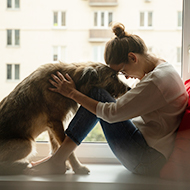
Survey reveals impact of COVID-19 on veterinary care
A recent survey of more than 3,200 pet owners from across four countries has revealed that a quarter of pet owners have delayed or missed appointments during the COVID-19 pandemic.
The survey - commissioned by the global animal health association HealthforAnimals - showed that more than one in ten pets had missed essential routine treatments such as primary vaccines.
Owners cited concerns around exposure to COVID-19 outside of 'social bubbles' as one of the main reasons for missing appointments.
“These survey results reveal yet more worrying, secondary impacts of the pandemic, with pet owners reluctant to visit a veterinarian and animal health suffering as a result,” said Dr Simon Doherty, senior lecturer in Animal Health & Welfare at Queen’s University Belfast and former president of the BVA.
“The reality is that veterinarians and veterinary services have been recognised as essential throughout the pandemic because animal health is a core element of public health. If pets are not receiving routine healthcare including vaccination, we could see an increase in preventable diseases and other health issues.”
A large number of veterinary practices have taken steps to reduce the risk of spreading COVID-19, with 47 per cent of owners surveyed reporting that their veterinary practice offered digital or remote appointments. This is more than double what was reported before the pandemic.
Three quarters of pet owners who used veterinary telemedicine during the pandemic said that they were satisfied or extremely satisfied with the service. More than 60 per cent said that they would be more likely to seek a veterinary consultation if they could do so virtually.



 The latest
The latest